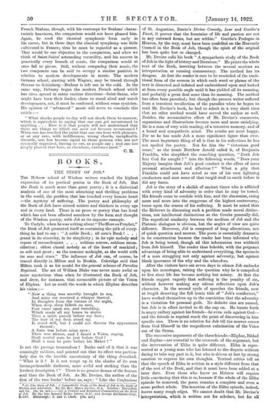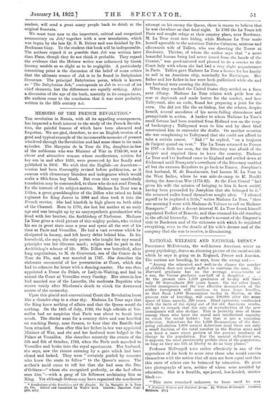BOOKS.
THE STORY OF JOB.* THE -Hebrew school of Wisdom writers reached the highest expression of its poetical genius in the Book of Job. -But the Book is much more than great poetry ; it is a dialectical analysis of one of the most absorbing and thrilling -problems in the world, the problem that has touched every human heart the mystery of.suffering. The -poetry and philosophy of the Book of Job have stirred writers and thinkers -in every age and in every land. There is no prose or poetry that has -lived which .has not been affected somehow by the form and thought of the Wisdom poetry, with Job as its supreme example.
To Carlyle, when he was writing about " TheHero as Prophet," the Book of Job presented itself as containing the pith of every- thing he had to say ".A noble Book ; all men's Book . . . grand in its sincerity, in its simplicity ; in its epic melody and repose of reconcilement . . . sublime sorrow, sublime recon- ciliation ; oldest choral melody as of the heart of mankind ; so soft and great ; as the summer midnight, as the world with its seas and stars." The influence of Job can, of course, be traced directly in Milton and in Ruskin. Coleridge -said that Milton took it as his model for the general scheme of Paradise Regained. The art of William Blake was never more awful or more mysterious than when he illustrated the Book of Job, and drew, for instance, that memorable picture of the Vision of Eliphaz. Let us recall the words in which Eliphaz describes his vision :— " Now •a thing was secretly brought to me, And mine ear received a whisper thereof.
In thoughts from the visions of the night, When deep sleep falleth on men, Fear came -upon me, and trembling, Which made all my bones to shake.
Then a spirit passed before my face ; The hair of my flesh stood up.
It stood still, but I could not discern the appearance thereof ; A form was before mine eyes : There was silence, and I heard a Voice, saying, Shall mortal man be just before God ? Shall a man be pure before his Maker ? "
Is not the passage tremendous ? Burke said of it that it was amazingly sublime, and pointed out that its effect was particu- larly due to the terrible uncertainty of the thing -described. "What is it ? Is it not wrapt up in the shades of its own incomprehensible darkness, more awful and striking than the liveliest description ? " There is no greater drama of the human soul than the Book of Job. As Mr. Devine, the author of the first of the two books r before us, says : " Like the Confessions • (1) The Story of Job : a Sympathetic Study of the Book of Job in the Light of 'Aston, and Literature. By the Rev. Minos Devine, M.A. London : Macmillan Ind Co. (Se. 8d. net.]—(2) A Critical and Exegetical Commentary on the Book of Job. By the late Samuel Rolla Driver, D.D., and George Buchanan Gray, ).Litt. Edinburgh : T. and T. Clark. Pas. net.] of St. Augustine, Dante's Divine Comedy, Lear and Goethe's Faust, it proves that the fountains of life and passion are not in any outward forms, but are within." Goethe's Prologue in Heaven, by the way, must have been-modelled on the Heavenly Council in the Book of Job, though the spirit of the original has been quite lost or changed.
Mr. Devine calls his book " A sympathetic study of the Book of Job in the light of history and literature." He prints the whole text -of the Book, inserting between the several sections an interpretation or running commentary. The method has its 'dangers. At first the reader is sure to be reminded of the tradi- tional form of the sermon in which each word or phrase -of the text is dissected and inflated and -embroidered upon and looked at from every possible angle until it has yielded all its meaning, and probably a great deal more than its meaning. The method has often been-parodied ; but though the present writer suffered from a transient recollection of the parodies -when he began to read Mr. Devine's book, he had to admit in a very short time that no other method would have served the author so well. Besides, the accumulative effect of Mr. Devine's comments, expansions and illustrations become more and more satisfying. He is a man of very wide reading, of a retentive •memory, and of a broad and sympathetic mind. The results are most happy. For us he has made Job a more significant figure than ever. The most important thing of all is that in his reflections he has not spoiled the poetry. Not for him the " victorious good sense," as the ironic Matthew Arnold called it, of Benjamin Franklin, who simplified the searching question, " Doth Job fear God for nought ? " into the following words, " Does your Majesty imagine that Job's good conduct is the effect of mere personal attachment and affection ? " What a pity that Franklin could not have acted as one of his own lightning conductors and sent some of that turgid stuff to earth before it did any harm.
Job is the story of a sheikh of ancient times who is afflicted with every kind of adversity in order that he may be tested. His friends come to condole with him, and the discussion, rising more and more into the empyrean of the highest controversy, turns upon the reason of his suffering. It must be noted that the Hebrews in discussing such a problem made moral distinc- tions, not intellectual distinctions as the Greeks generally did. The superficial similarity between the medium of Job and the Platonic dialogues is obvious, but the angles of view are quite different. Moreover, Job is composed of long allocutions, not of quick question and answer. The poem is essentially dramatic in its construction because the reader has been informed why Job is being tested, though all this information was withheld from Job himself. The reader thus beholds, with the poignant advantage of being able to understand everything, the spectacle of a man struggling not only against adversity, but against blank ignorance of the why and the wherefore.
After the visitors have sat seven days in silence. Job embarks upon his monologue, raising the 'question why he is compelled to live since life has become nothing but misery. At first the friends suggest vaguely that suffering is the penalty of sin, without however making any odious reflections upon Job's character. In the second cycle of speeches the friends, now at length deserving the full ironic title Of " Job's comforters," have worked themselves up to the conviction that the adversity is a visitation for personal guilt. No definite sins are named, but Job is in effect invited to fit the cap on. He bursts forth in angry raillery against his friends—he even rails against God—. and the friends in reprisal reach the point of discovering in him specific sins. There is no solution for Job till the answer comes from God Himself in the magnificent culmination of the Voice out of the Storm.
The successive arguments of the three friends—Eliphaz, Elided and Zophar—are essential to the crescendo of the argument, but the intervention of Elihu is quite different. Elihu is repre- sented as a young man who has listened to the dispute without daring to take any part in it, but who is driven at last by strong emotion to express his own thoughts. Textual critics tell us that the speech of Elihu is written in a style different from that of the rest of the Book, and that it must have been added at a later date. Even those Who know no Hebrew will require little convincing that this is so, because if the -whole of the Elihu episode be removed, the poem remains a complete and even a more perfect whole. The insertion of the Elihu episode, indeed, leaves many rough edges. We cannot doubt that Mr. Devine's interpretation, which is written not for scholars, but for all
readers, will send a great many people back to drink at the original fountain.
We must turn now to the important, critical and exegetical commentary on Job,2 together with a new translation, which was begun by the late Da.. S. R. Driver and was finished by Dr. Buchanan Gray. To the student this book will be indispensable. The authors regard it as possible that Job was written later than Plato, though they do not think it probable. They regard the evidence that the Hebrew writer was influenced by Greek literary models as so slight as to be negligible. A particularly interesting point is the discussion of the belief of some critics that the ultimate source of Job is to be found in Babylonian literature. The principal Babylonian poem, which is known as " The Babylonian Job," corresponds- to Job in several of its chief elements, but the differences are- equally striking. After a•discussion of the age of the book, masterly in its compactness, the authors come to the conclusion that it was most probably written in the fifth century n.e.



































 Previous page
Previous page